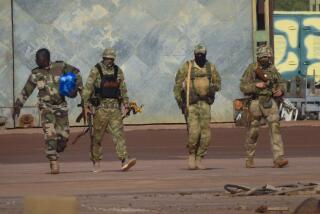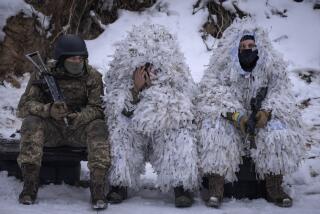Cold Cash Fuels Russian Fighting Spirit in Bosnia : Mercenaries: Some battling alongside rebel Serbs are ex-soldiers. But many simply needed a job.
- Share via
BAJINA BASTA, Yugoslavia — It is only midday, but Viktor Pospekhov is already having trouble lighting his cigarettes. His eyes are glazed and his speech is slurred from a breakfast of beer and brandy. The match in his right hand can’t quite find the flint-edged box in his left.
Won over by the plentiful food and liquor provided by his Serbian hosts, the staggering soldier, AWOL from St. Petersburg, hardly measures up to the fearsome image projected by Belgrade media of elite Russian troops striking terror in the hearts of Bosnia-Herzegovina’s Muslims.
But even a poorly aimed spray from Pospekhov’s Kalashnikov automatic rifle makes up for what the 40-year-old career soldier lacks in focus and coordination. Less than a month into his service at the side of Bosnia’s rebel Serbs, Pospekhov claims to have killed six Muslims.
One of scores of Russian mercenaries deployed in Bosnia’s killing fields, Pospekhov dismisses questions about the morality of gunning down strangers for money.
Those are “political issues” for which he has little interest.
“I’m a professional soldier. I do what I am told and leave the politics to the politicians,” says Pospekhov, whose only vestige of military bearing is his crew-cut blond hair. “I came here because there is work to do, whereas in Russia the army is finished.”
By the accounts of Pospekhov and fellow Russians based in the nearby Bosnian village of Skelani, the mercenaries are no more bound to a military command structure than are the unruly bands of Serbs they are aiding. Despite the lack of organization and discipline, their side is winning the year-old war because of a colossal advantage in arms over the Muslim-led Bosnian government.
The Russians are fed, clothed and armed by Serbs and paid a “token” salary of about $155 a month, says Yuri Belyaev, a baby-faced neo-Nazi from St. Petersburg who recruits idle Russians for the Bosnian war. He says there are 400 to 500 Russian soldiers of fortune in the Balkan battlefields, based in groups of about 20 in front-line towns like Trebinje, Visegrad and the Sarajevo suburb of Pale. He says some of the Russians are involved in economic rather than military activities, like smuggling gasoline.
Western diplomats contend that Belyaev’s estimate of the Russian presence is exaggerated, and they put the number at closer to 200--the figure cited by Russian television in a documentary on the mercenaries in early March.
Six Russians have been killed and several others wounded, says Belyaev, who insists that more volunteers are making their way to Bosnia every week.
Unlike Pospekhov, who claims to be fighting for Slav brotherhood, Belyaev says he has been organizing and expanding Russian activities here to prepare for what he sees as a similar war of nationalities ahead for his own country.
“Our role here is primarily ideological. Serbs and Russians are both Slavs, and our presence at the Serbian side sends a message to their enemies,” says Belyaev. “But there are also practical concerns. This is good preparation for us. It is very important that we get experience in the Yugoslav conflict for when this situation occurs in Russia.”
Belyaev describes himself as a businessman trading in the commodity of fighters. He says money for his recruits comes from like-thinking businessmen at home in St. Petersburg and in lucrative Serbian enterprises like the private banks closely allied with the Belgrade regime.
He was indicted in mid-March by the St. Petersburg prosecutor’s office on charges of violating the Russian criminal code that outlaws “stirring up anti-Semitic, racist or ethnic dissent.” Besides recruiting volunteers for three-month stints in the Balkan war, Belyaev has founded a National Socialist Party in Russia, espousing the racist policies of Adolf Hitler.
“I must stay here now because of the political situation back home. I would be arrested if I tried to return,” Belyaev says, expressing the hope, though not the expectation, that Russian President Boris N. Yeltsin might be overthrown.
Most of the 22 Russians in Skelani, who traveled together to this Drina River town for a Serbian comrade’s funeral in late March, declined to be interviewed for fear of attracting official censure, as has happened to Belyaev.
The Russians concede that the war here is one-sided because Bosnian government forces have few sources for arms. But they share the Serbs’ view that Muslims are inferior people and therefore fair targets for their guns. They also express respect for the Serbian practice of “ethnic cleansing,” by which most of Bosnia’s Muslims have been routed from their homes.
“This is a civil war. We need to push the Muslims out, as if they were never here,” Pospekhov says, drawing nods from his countrymen. “The Muslims still live in some areas (of eastern Bosnia), and the Serbs want them out so they can live alone in peace. If there were no more Muslims, there would be no more war.”
When referring to the Bosnian Muslims, Pospekhov uses the same crude racial epithet that backward Russians apply to Central Asians, though he acknowledges that the perceived enemies here are fellow Slavs. “Muslims live in tribes, which have different standards of behavior than we do,” he replies when asked why his commitment to Slavic unity extends only to the Serbian side.
Voicing the deeply anti-Semitic sentiments of many Russian nationalists, Pospekhov offers the opinion that Yugoslavia was doomed by the post-World War II leadership of Marshal Josip Broz Tito. “Tito was a Jew,” he says, offering his inaccurate explanation of the federation’s breakup.
While the Russian volunteers take part in Serbian offensives, Belgrade-based diplomats and academics say the mercenaries’ influence in the fighting is limited and that their main purpose is to provide a psychological boost to the scorned and isolated Serbs.
Belyaev says some of his troops are former soldiers of the Soviet army and a few are veterans of combat in Afghanistan or the restive Caucasus republics. But most, like himself, are civilians acting on nationalist instinct.
The Russians based in Skelani all appear to be unskilled and disgruntled, drawn to a foreign conflict primarily by a lack of job opportunities back home.
Even Belyaev concedes that many of his recruits are in this war for the money.
Experts in Russian political affairs reject the notion touted in Belgrade that Russian troops and oil will be rushed to Serbia if Moscow’s conservative opposition triumphs in its struggle for power. “This is erroneous thinking that Russia is always ready to help us. If you look at history, Russia has mostly exploited Serbia to its own advantage,” says Jelica Kurjak, a specialist in Russian affairs at Belgrade’s Institute for International Politics.
Russians today are too distracted by their own economic struggles to pay much heed to Serbia or its doomed quest to conquer the Balkans, says Kurjak.
Familiar with Russian society from seven years as a student in Moscow, she says she doubts there is any real commitment to the concept of Slav Orthodox unity, even in the conservative circles challenging Yeltsin for power. For Russia to overcome its social and economic turmoil, it will need massive aid from the West, Kurjak says, which would be withheld if Moscow was to openly side with Serbia in its globally condemned aggression against other republics.
“As long as there is a crisis in Russia, Yeltsin’s opposition will pretend to support the regime here,” she says. “But even the opposition will never cross the border of involvement to the point that it starts hurting itself.”
More to Read
Sign up for Essential California
The most important California stories and recommendations in your inbox every morning.
You may occasionally receive promotional content from the Los Angeles Times.













